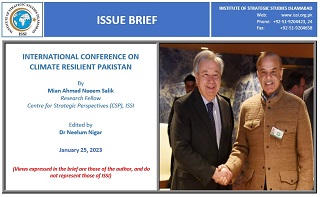Background
Pakistan has long been considered one of the most vulnerable countries to climate change in the world. While Pakistan is one of the lowest contributors to climate change, it is one of the most impacted countries in the world. Pakistan ranked 8th among the top 10 disaster vulnerable countries in the Global Climate Risk Index in 2021 and was hit by both heatwaves and devastating floods in 2022.[1]According to the latest report of the Post-Disaster Needs Assessment (PDNA), Pakistan needs at least $16.3 billion for post-flood rehabilitation and reconstruction. The PDNA report, released by the representatives of the government and the international development institutions, calculated the cost of floods at $30.1 billion – $14.9 billion in damages and $15.2 billion in losses.[2]
In this regard an International Conference in Geneva, convened specifically to support the affectees of climate induced disaster in Pakistan on January 9, 2023. It was co-hosted by the Government of Pakistan (GOP) and the United Nations (UN). The Conference brought together governments, leaders from the public and private sectors, and civil society to support the people and GoP to deal with the aftermath of the losses incurred due to floods.[3] The objective of this Conference was to present the ‘Resilient Recovery, Rehabilitation, and Reconstruction Framework’ (4RF), which lays out a multi-sectoral strategy for rehabilitation and reconstruction in a climate-resilient and inclusive manner, and, secondly, to secure international support and forge long-term partnerships for building Pakistan’s climate resilience and adaptation.















